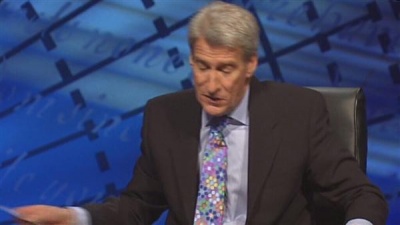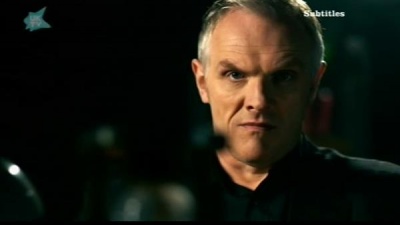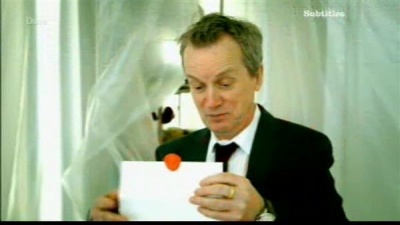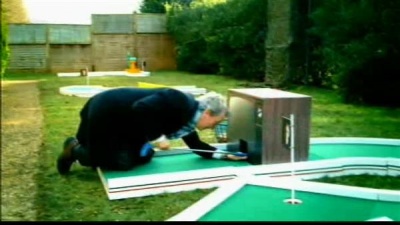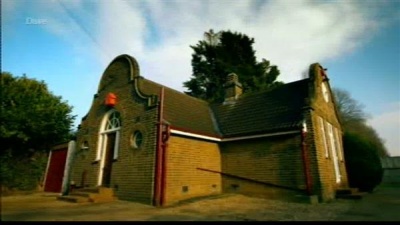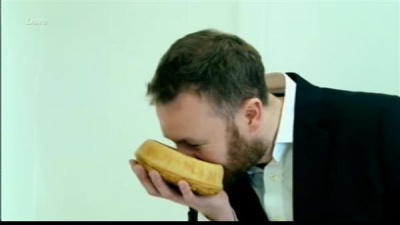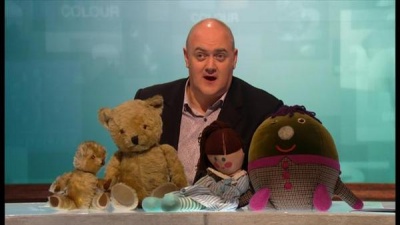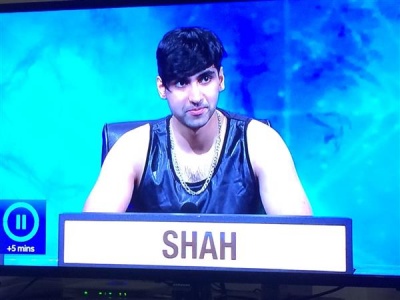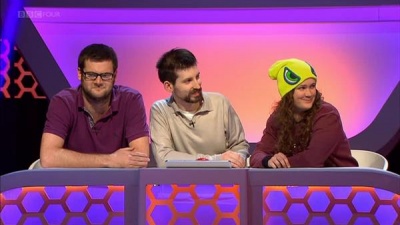Weaver's Week 2015-09-13
Last week | Weaver's Week Index | Next week
What is he wearing?
Contents |
Taskmaster
Avalon for UKTV (shown on Dave), 28 July – 1 September
"The Sort Of Thing We Might Like" said Bother's Bar ahead of the first episode, later revised to "The Sort of Thing We Do Like". Steve Williams from Creamguide chipped in, "I really am enjoying Taskmaster, it makes me laugh loads." This column likes bits of the show, but it hasn't caught our imagination.
The basic idea is that Alex Horne (of Countdown fame) has devised some surreal things to do. For instance, play a round of crazy golf, but don't use balls, use eggs. Five contestants will do this, in whatever style they choose, and Greg Davies (who we've never knowingly seen before) will rank them from top to bottom.
Throughout the series, the same five contestants took part. We have a suspicion that they'd been selected to fill quotas. So we had Frank Skinner, to fill the quota of "older comedian who you might have heard of". There was Tim Key, to fill the slot marked "unsettling comedian and topical poet". Josh Widdicombe, in a chair labelled "shouldn't you be in school". Roisin Conarty was the token woman. Romesh Ranganathan was the Scrappy Doo of the group, by which we mean that his performance subtracted value from the show. (It's this blog's opinion, lots of other people disagree, and we're not going to dwell on it.)
So contestants have these surreal things to do, and they'll be ranked. Each show begins by discussing the week's prizes, purchased from the massive prize budget available on commercial television. No! They've been brought by the contestants, from home. Items that meet a particular niche, such as "This makes me satisfied". The players can interpret this how they wish: there might be the satisfaction of completing a sticker album, or the satisfaction of a good dish well cooked. Greg Davies critiques, in a tone of voice that implies "very little will ever please me", and awards marks.
The bulk of the programme is three filmed challenges – one gets a long edit of about 15 minutes, and often there is a team challenge. Players might, for instance, be asked to paint a horse while riding a horse. Or they might make a meal using ingredients that include every letter of the alphabet. Or they might guess the filling of a pie without breaking the pastry.
Taskmaster encourages its players to treat the rules as a framework, to improvise and think outside the box. The round of golf using eggs was a smashing time for many players. The yolk was on them, and on their clubs and the ground. Except for Tim Key, who spent ten minutes hard-boiling his eggs and wrapping them in foil to protect the shell a little more. Didn't win the round, but it's perfectly legal.
There is a certain amount of banter and bicker, Greg Davies will hear argument, and may be convinced by argument. More often than not, he won't be convinced by arguments.
Each show finishes with a studio challenge, such as – sort blue sweets from other sweets, while wearing boxing gloves. At the end of this task, the winner is whoever's had the best ranking over all the events. As the same players returned for all shows, it was possible to declare Josh Widdicombe the winner across the series.
We were very impressed with the cinematography on Taskmaster. Lighting levels were chosen to give an atmosphere: slight foreboding, but any menace lasted moments. Camera angles told the story without narration, just commentary from the players as they took part. The editing also impressed us: they've worked out what the story is, and tell it straight. There are rarely jumps from player to player, and no discontinuities that leave us confused. It's a silky smooth ride.
There was great attention to detail, and a certain nostalgic charm to the show. Challenges came in envelopes with a wax seal, and the house was a shrine to Greg Davies. The big Taskmaster is watching you, dear player. Most of the challenges took place in a cottage on Dukes' Meadow in Chiswick.
The challenges in Taskmaster fall into the Fluxus school of performance art. Take familiar items and activities, and combine them in unusual ways. And give the players room to interpret this stimulus how they want. Leave the ideas open, and let them entertain us in their own way. It's a loose format, it's got a recurring troupe of players who we can get to know, and it's obvious that Greg and Alex love their jobs. (We'll look into this idea further next week.)
But there is a problem with Taskmaster, and it's greater than the show. It's a problem with the Dave channel, and its approach to comedy. Dave likes "witty banter": arguing for the sake of being heard and for comedy, in that order. There is a place for "witty banter" comedy, but it's not the only sort of comedy there is. Taskmaster had four performers in the "witty banter" mode, and the surrealist Alex Horne.
And that's why we found Taskmaster to be monotonous: it was literally one tone of comedy throughout. There was just too much from the "witty banter" side of things, not enough comedy variety to keep us watching. This could be changed with just a few tweaks to the casting: bring in a Zoe Lyons, a Pete Firman, a Joe Lycett, or promote a newcomer to television.
Some of the more exuberant fans suggested Taskmaster be re-made for Saturday teatime on BBC1, to fill the slot occupied by such successes as Don't Scare the Hare and Reflex. Could work, the challenges are mostly simple enough for a six-year-old to understand them, and the material need not be at all rude. (Dave is demonstrating this with pre-watershed edits). And it's not as though the bar has been set particularly high, with such flops as Don't Scare the Hare and Reflex.
This column's conclusion? The elements are there for a great series, the casting ensured there's room for improvement next time. Viewers concluded that this was a popular series, trending upwards as the series ran on, and turning into Dave's biggest breakout hit since Argumental. We will doubtless see more Taskmaster.
This Week and Next
Readers may remember the Eurovision Song Contest last May, which began at 8pm on Saturday, and ended at two minutes to midnight. SVT have proposed a change to prevent this from happening again: they'd like to start an hour earlier.
We've been looking at some historical listings, and find that the 8pm (UK time) start has varied over the years. In 1977, it started at 9pm, and some of the earliest editions didn't begin until 10pm. The constant thing has been the end time: at or just after 11pm. Extended voting sequences and more elaborate interval presentations lengthen the show, and SVT accepts that a four-hour programme is here to stay. Bite the bullet and move it an hour earlier.
One reason to look at historical listings is so we can work out who presented the BBC television and radio coverage before W*g*n. Lots for David Jacobs, the most popular presenter of his day. But there was no radio coverage until the BBC hosted the contest in 1968. Katie Boyle was such a good presenter that the BBC didn't need a commentator that year.
David Gell was listed in the Radio Times as television commentator for 1969. But the whole interweb says it was Michael Aspel. We're confused: was Gell unavailable through illness? Or is someone wrong on the internet? If you can help, and you've got hard evidence to back up your claim, let us know.
Returning to the present day, and The Apprentice You're Fired has become a magnet for People This Column Would Rather Not Watch. Dara Ó Briain has left the programme, to be replaced by comedy sponges Jack Dee and Romesh Ranganathan. With the spectre of Alan Sugar looming over the programme, all it needs is an Apprentice contestant to turn us off completely. (Flicks over to Big Centre TV.)
Quiz update
Week nine on University Challenge, and it's a Cambridge – Derby match. Sorry, a Cambridge derby match, most unusual for the first televised round. King's Cambridge (Kevin Lin, Alessandro Mariani, Jack Smith, Kamel Shah) took on Sidney Sussex Cambridge (Nicholas Bennett, Elly Thompson, Thomas Hitchcock, Dan Wilson).
The match is decided on the second starter, which begins "Which two words", so any response that is just "Heart" will be wrong. That's a penalty to King's, knocking their confidence. There were also comedy moments, with Roger Tilling able to call his favourite Norfolk resort, and King's answering a question thus:
- Nominate Lin. - What! I don't know. - LAUGHTER - Do you want to nominate somebody else, or have a go yourself? - Nominate Mariani. - LAUGHTER - Erm... Candela? - Correct!
Sidney Sussex won by 195-60, with a correct answer rejected as the gong went.
To answer viewer questions: yes, that top and neckwear was unsuitable wear for primetime BBC2. But Paxman has worn a suit and tie for twenty years and he's not going to change into a vest now. Yes, it's the first time two Cambridge (or Oxford) sides have met in the first round during the BBC revival. We must note that there were two all-Oxford and one all-Cambridge matches in the "Reunited" series over summer 2002.
The entire series of University Challenge 2015-16 was filmed in the early months of 2015 (we think it was all wrapped up before Easter), and well before transmission. Any prediction contest needs the producers to reveal the full draw ahead of time, but the listings don't even tell us who is appearing in which knockout show before it airs.
And BBC2 always runs late on Monday nights, so that BBC1 can throw to Newsnight when its bulletin ends at 22.32. If Huw Edwards had faster diction, Only Connect would start on time.
And that would mean less time for Victoria and the teams, who spent last night searching for the perfect cocktail in Cardiff. Improved drugs testing is also referenced in the first question, on men's athletic field sports records and how they haven't changed since 1996. The Unified Field Theory of Creep was activated on the music round, with the first play of "Fairytale of New York": only 109 days until Cel Spellman hosts Top of the Pops. H2G2 was (and is) so much more reliable than any other wiki. A marvellous tribute to Douglas Adams.
On the show, the Polyglots took a lead with omitted double letters (gronda, gronda). The Operational Researchers did well on the Sequences round, with a pair of three-pointers on England men's football world cup "songs" and CS-CT-CU-CV. A stronger wall proved to be the difference, and the Operational Researchers won by 25-13.
Marianne Fairthorne submitted her bid for the Mastermind—Game Show Hat double, and the committee acknowledges her entry. On this week's Hive Minds, the Lutrophiles defeated the Araucarians by 23-21. Two lacunae in the Araucarians' knowledge cost them. They don't know Bearsden near Glasgow to complete the Superhive, and they don't know enough cocktails. Doubtless the host will have filled them in afterwards. The Lutrophiles look shaky on the final buzzer round.
Heat six of Mastermind, and we've seen seven PERFECT ROUND!!s on specialist subjects. Three of them arrived on this week's programme, and one came from the winner. Ewan Paton was perfect on Harold Wilson, and snapped out answers quickly. He took the victory over Margaret Brown (perfect on Old Harry's Game) by 28 to 27; neither player passed. David Shah was perfect on the Roman army, but incurred some passes in his general knowledge round and finished on 26 (4 passes). Geoff Snape finished fourth on 21 points.
BARB ratings for the week to 30 August.
- Another week, another peak for The Great British Bake Off, now 12.35m viewers.
- The X Factor returned with 7.35m seeing the "action", and a further 1.6m on ITV-HD. The opinion when overnight figures emerged was that this was "a disappointment", but the ratings benefited from nearly 2m people watching on timeshift. The moral? Overnight ratings are not the whole story.
- Pointless Celebrities brought 3.8m to BBC1 Saturdays. Keep It in the Family (3) on ITV had a series-best 2.95m, just ahead of University Challenge (2.9m). Through the Keyhole returned to 2.85m, beating Dragons' Den and the "Celebrity" Big Brother launch (both 2.55m).
- Catsdown pulled 1.95m to Channel 4 on Friday, beating the sort-of-game-show-if-you-squint Special Forces Ultimate Hell Week (1.8m on BBC2 Sunday).
- Xtra Factor returned as the top non-PSB game show, with 695,000 viewers wanting more. X Factor repeats and Hell's Kitchen both brought 560,000 to ITV2, and Taskmaster pulled a very respectable 460,000 to Dave. They're doing something right.
Good week for fans of daytime shows. The Fifteen-to-One series final (C4, Thu), classic Countdown on the Challenge channel (weekdays), and Noel Edmonds gets to play Deal or No Deal (C4, Fri). A new darts-and-prizes show comes to The Satellite Channel (180, from Tue), the grand final of Flockstars (ITV, Thu), and Miles Jupp takes over on The News Quiz (R4, Fri). On next Saturday's Pointless Celebrities, there's Louise Wener, Jayne Torville, Henry Kelly, and Tony Hawks. Over on ITV, Keep It in the Family (3) drops Louis Walsh out of view. Excellent!
Photo credits: Avalon; ÖRF / EBU; Initial (an Endemol company); ITV Studios; Saltbeef / Green Inc.
To have Weaver's Week emailed to you on publication day, receive our exclusive TV roundup of the game shows in the week ahead, and chat to other ukgameshows.com readers, sign up to our Yahoo! Group.

